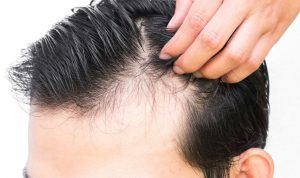 A common concern for many men, hair loss occurs when the hair follicles stop producing hair growth. Known as alopecia, it is particularly a worry for men, who often see a loss of hair as an unwanted sign of premature ageing.
A common concern for many men, hair loss occurs when the hair follicles stop producing hair growth. Known as alopecia, it is particularly a worry for men, who often see a loss of hair as an unwanted sign of premature ageing.
The reality is that male pattern hair loss is in fact an entirely normal part of ageing – up to 100 hairs are lost from your head every day. However, given that you have more than 100,000 hairs on your head, you probably wouldn’t notice it day to day. Some individuals, however, experience excessive hair loss and it is these people that often suffer the most. What should be remembered, though, is that medical help is available.
Types of hair loss
- Male pattern baldness
This is a hereditary or genetic form of baldness also known as androgenetic alopecia, caused by the body’s failure to grow new hair. Affecting men much more than women, about one quarter of men show signs of balding by the age of 30, and more than two thirds by the age of 60. Loss of hair may therefore be inevitable, depending on your genetic makeup, and shouldn’t be feared – yet it remains something that many individuals, mostly men, dread. But can genetics be overcome, can anything stem the loss? The simple answer is, yes, studies have shown some medications to have a clear and positive effect on male pattern baldness. - Alopecia Areata
Thought to be caused by autoimmune disease, the hair follicles do not die, but are attacked by the immune system causing the hair to fall out, both on the head and elsewhere. Though this can be very impactful and severe, the fact that the follicle does not die offers the chance of future growth, which can at times occur even without treatment. - Other causes
Hair loss can also be suffered by those undergoing treatment, such as chemotherapy, or through the administration of other medicines. It may be related to stress or hormonal change or disease, and even poor levels of nutrition can play a part.
Where a certain medication or treatment is the cause of baldness, the cessation of that treatment can lead to a reversal of the hair loss.
Whatever the cause, one thing is certain, and that is the impact that the loss of hair causes. It can be profound and extremely debilitative, often leaving the sufferer to experience a loss in self-esteem, as well as stress and anxiety.
Hair loss treatments
Treatments for hair loss will depend on its exact cause. Effectiveness may vary from person to person and can also depend on the extent of the hair loss suffered prior to the commencement of the treatment. Like most treatments, it is best to seek help from your doctor at the earliest opportunity, and to start treatment sooner rather than later.
Some cases of hair loss are caused by invasive treatments such as chemotherapy, or by particular medications. By simply stopping that treatment, the hair loss may rectify itself. Recovery from any illness that has caused hair loss will also often result in regrowth.
Unfortunately, however, some hair loss causes necessitate an actual medical intervention. Pattern baldness is permanent, but the development can be significantly slowed down or prevented whilst using various treatments.
Propecia / finasteride 1mg
 This medicine is known as an inhibitor. It slows/stops the body converting testosterone into DHT, a hormone that plays a very large role in hair loss. Propecia is a branded version of finasteride 1mg, which means that they are medically the same as one another. They are prescription-only medicine for men. Possible side effects include headaches, skin irritation, and in some instances a reduced sex drive and sexual function.
This medicine is known as an inhibitor. It slows/stops the body converting testosterone into DHT, a hormone that plays a very large role in hair loss. Propecia is a branded version of finasteride 1mg, which means that they are medically the same as one another. They are prescription-only medicine for men. Possible side effects include headaches, skin irritation, and in some instances a reduced sex drive and sexual function.
While such side effects may be a concern, they occur rarely and usually resolve once the medication is stopped.
Regaine Extra Strength
 Regaine Extra Strength contains minoxidil which dilates blood vessels in the scalp and improves hair follicle function by stimulating and then prolonging the hair growth phase.
Regaine Extra Strength contains minoxidil which dilates blood vessels in the scalp and improves hair follicle function by stimulating and then prolonging the hair growth phase.
It should be massaged into the scalp twice daily, but is not to be used on a broken, swollen or reddened scalp, as this may cause too much of the medication to be absorbed. The treatment is effective in preventing hair loss in 4 out of 5 men, and in re-growing hair in 3 out of 5 men. The possible side effects include dizziness, irritation, chest pains and headaches.
There is no doubting that hair loss is a significant event for anyone. Even temporary loss, through illness or treatment, can have a profound effect upon the wellbeing of the person concerned. But all is not lost. It should be remembered that help is often available and that not all hair loss is permanent. Furthermore, even where genetics and the simple passage of time are behind the hair loss, some treatments can significantly delay or reduce the overall loss. Hair loss, like any other medical condition, requires treatment and attention, and the sooner that is sought, the more likely it will be successful.



